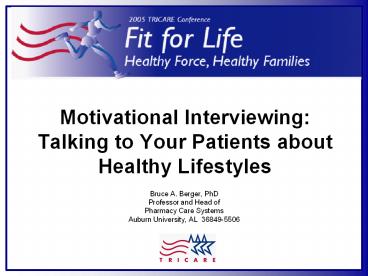Motivational Interviewing: Talking to Your Patients about - PowerPoint PPT Presentation
1 / 19
Title:
Motivational Interviewing: Talking to Your Patients about
Description:
Motivational Interviewing: Talking to Your Patients about Healthy Lifestyles Bruce A. Berger, PhD Professor and Head of Pharmacy Care Systems Auburn University, AL ... – PowerPoint PPT presentation
Number of Views:328
Avg rating:3.0/5.0
Title: Motivational Interviewing: Talking to Your Patients about
1
Motivational Interviewing Talking to Your
Patients about Healthy Lifestyles
- Bruce A. Berger, PhD
- Professor and Head of
- Pharmacy Care Systems
- Auburn University, AL 36849-5506
2
SOME THINGS TO REFLECT ON
- Managing an illness requires change (behavior
modification) - 1 trillion in health care costs last year
- 51 behavioral
- Currently affecting 2
- The rate of adherence to medication regimens has
not changed in 40 years lifestyle changes are
worse
3
KEY CONCEPTS
- Ambivalence
- Resistance
- Goals
- Dissonance
- Readiness
- Importance
- Confidence
- Decisional Balance
- Autonomy
- Respect
4
(No Transcript)
5
Biomedical and Psychosocial Models
- Practitioner centered
- Information giving
- Save the patient
- Dictate behavior
- Compliance
- Authoritarian (P-C)
- Motivate the patient
- Persuade, manipulate
- Resistance is bad
- Argue
- Respect expected
- Patient centered
- Information exchange
- Patient saves self
- Negotiate behavior
- Adherence
- Servant
- Assess motivation
- Understand, accept
- Resistance is information
- Confront
- Respect earned
6
- Most people who are faced with change are not
ready to take action (70) - smoking example
- disease management
- Several stages must be passed through BEFORE
action occurs - Object is to move people from one stage to the
next, NOT directly to action - Stage specific communication skills and
strategies are required
7
- Consciousness raising
- Self reevaluation
- Social reevaluation
- Counter conditioning
- Stimulus control
- Self-efficacy
- Self liberation
- Social liberation
- Dramatic relief
- Helping relationships
8
The Stages of Change Approach
Precontemplation Contemplation Preparation Acti
on Maintenance
Step 1 Assess the patients stage of readiness
to adhere to the prescribed regimen. Step 2
Help patient to move forward in the stage
continuum by using stage-specific, tailored
messages.
9
Motivational InterviewingA Definition
- Motivational interviewing is
- person-centered
- directive
- method of communication for enhancing
intrinsic motivation to change by exploring and
resolving ambivalence.
10
The Spirit of Motivational Interviewing
- Collaboration
- Evocation
- Autonomy
11
Motivational Interviewing
- Developed to identify stage of readiness of
patient - Create a favorable climate for change
- Use stage specific skills and strategies to move
people forward - Addresses ambivalence and resistance
- Takes 3-5 minutes
12
The Menu of Strategies
- Opening strategy lifestylehow does the patient
view it? - A typical daywhats the routine?
- Needed for tailoring
- Identifying dietary needs/problems
- Exercise
13
The Menu of Strategies
- The good things and less good thingswhat do they
like and dislike about the proposed changes?
What is their representation of the illness and
its treatment? Do they agree with the MD? Do
they believe they can do what is asked? What
will help? What are the barriers? - Providing Information
14
The Menu of Strategies
- The future and the present additional concerns
- Helping with decision making
- What are your thoughts now about managing
your... - Where does this leave you now?
- Do you anticipate having any help?
- ELICIT PROVIDE ELICIT
15
The Five General Principles of Motivational
Interviewing
- Roll with resistance
- Express empathy
- Avoid argumentation
- Develop discrepancy
- Support self-efficacy
- R E A D S
16
SUMMARY - Elicit Change Talk
- Asking Evocative Questions
- Explore Readiness
- Exploring the Decisional Balance
- Elaborating
- Querying Extremes
- Looking Back / Looking Forward
- Exploring Goals and Values
17
GAWPOW
18
Suggested Readings
- Miller, W.R., and Rollnick, S., Motivational
Interviewing, The Guilford Press, London, 2002. - Prochaska, J., and DiClemente, C., Toward a
Comprehensive Model of Change, In Miller, W.R.,
Heather, N. (eds.) Treating Addictive Behaviors
Processes of Change, The Plenum Press, New York,
1986. - Rollnick, Stephen, et.al., Health Behavior
Change,Churchill Livingstone, London, 2003. - Berger, B.A., Hudmon, K.S., Readiness for
Change Implications for Patient Care, Journal
of the APhA, May/June, 1997, pp. 321-329. - Johnson, S.S., Grimley, D.M., and Prochaska,
J.O., Prediction of Adherence Using the
Transtheoretical Model Implications for Pharmacy
Care Practice, Journal of Social and
Administrative Pharmacy, Vol 15, No. 3, 1998, pp.
135-148.
19
Bruce Bergerbergeba_at_auburn.edu
- 334-844-8302
- 334-844-8307 fax
- Pharmacy Care Systems
- 128 Miller Hall
- Auburn University, AL 36849-5506































